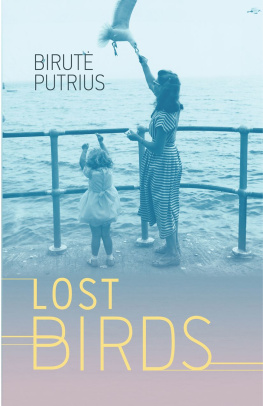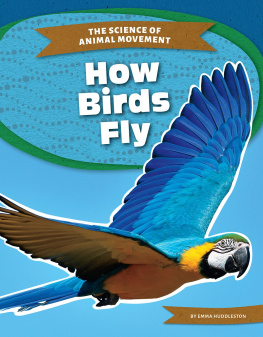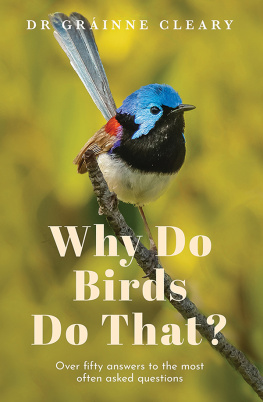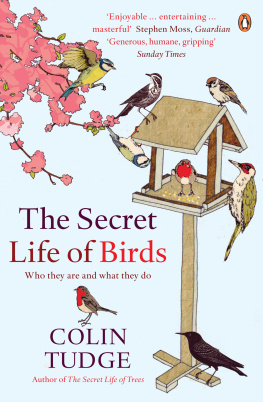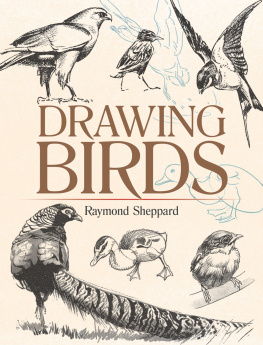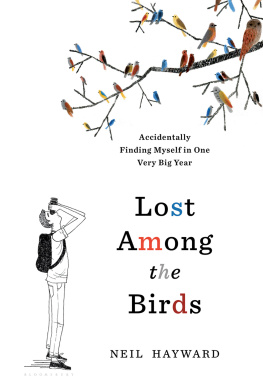Birute Putrius - Lost Birds
Here you can read online Birute Putrius - Lost Birds full text of the book (entire story) in english for free. Download pdf and epub, get meaning, cover and reviews about this ebook. year: 2015, publisher: Birchwood Press, genre: Non-fiction. Description of the work, (preface) as well as reviews are available. Best literature library LitArk.com created for fans of good reading and offers a wide selection of genres:
Romance novel
Science fiction
Adventure
Detective
Science
History
Home and family
Prose
Art
Politics
Computer
Non-fiction
Religion
Business
Children
Humor
Choose a favorite category and find really read worthwhile books. Enjoy immersion in the world of imagination, feel the emotions of the characters or learn something new for yourself, make an fascinating discovery.
- Book:Lost Birds
- Author:
- Publisher:Birchwood Press
- Genre:
- Year:2015
- Rating:5 / 5
- Favourites:Add to favourites
- Your mark:
- 100
- 1
- 2
- 3
- 4
- 5
Lost Birds: summary, description and annotation
We offer to read an annotation, description, summary or preface (depends on what the author of the book "Lost Birds" wrote himself). If you haven't found the necessary information about the book — write in the comments, we will try to find it.
Lost Birds — read online for free the complete book (whole text) full work
Below is the text of the book, divided by pages. System saving the place of the last page read, allows you to conveniently read the book "Lost Birds" online for free, without having to search again every time where you left off. Put a bookmark, and you can go to the page where you finished reading at any time.
Font size:
Interval:
Bookmark:
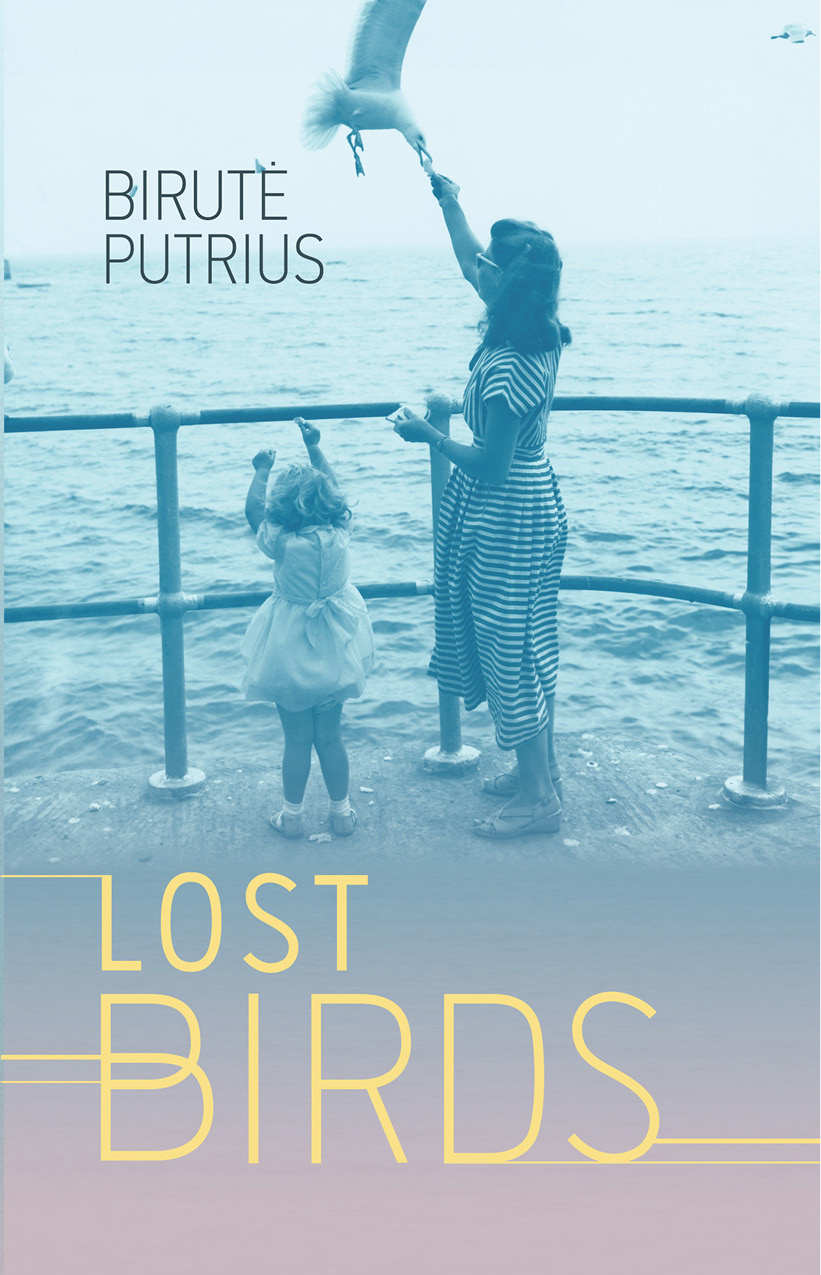




Lost Birds
Copyright 2015 by Birute Putrius Birchwood Press. All rights reserved.
No part of this book may be reproduced in any form or by any means, electronic, mechanical, digital, photocopying or recording, except for the inclusion in a review, without permission in writing from the publisher.
This is a work of fiction.
Names, characters, places, and incidents either are a product of the authors imagination or are used fictitiously. Any resemblance to actual persons, living or dead, events or locales is entirely coincidental.
Published in the USA by:
Birchwood Press
Send inquiries to birchwoodpress@gmail.com
www.birchwoodpress.com

ISBN 978-0-9965153-0-6 (paperback)
978-0-9965153-1-3 (ebook)
Book interior layout by Darlene Swanson www.van-garde.com
For Max and Anna and Algis
Becoming American
Irene Matas, 1950
I t took eleven long days and nights to cross the Atlantic Ocean on the General Howze, a GI troop transport. For five days it stormed, raising mountains of water that made me feel so small. Everyone was sick, including my mother. My older brother, Petras, couldnt get out of bed for two days, which made my mother frantic since the men and women were separated on different levels. My father took care of Petras as best he could until the sea finally calmed. The next day, my mother stood with me and my brother on the deck, holding our hands as she pointed to the schools of flying fish leaping out of the blue water. Fish can fly! I said, delighted, not knowing it was possible. When I turned to look at my pale brother, I saw he was smiling, his eyes shining as he stared at the magical creatures that were part bird and part fish.
On the last day of our voyage, our family stood on deck watching the great city of New York in the distance, with its towers touching the sky. It was so amazingly different from our displaced-persons camp in Bavaria, where I was born after the war. When we reached New York Harbor, we disembarked like birds thrown out of our nest, staring at the immense forest of skyscrapers. I was a timid girl, and the huge city scared me. Everything seemed too big.
So this is America? my mother asked my father.
Well, it isnt Kaunas, he answered, his face exhausted by the journey. The sharp October wind blew newspapers and dust across the grimy street, clearly distressing my mother, who craned her neck to see the tops of the buildings.
Oh, Viktoras, its so big, and theres no grass. Where will the children play?
My weary father put a reassuring hand on her shoulder. Dont worry, Dora, Mr. Jankus said there was a part of Chicago as green as Samogitia.
That same day we boarded the train to Chicago.

Our American sponsor, Mr. Jankus, met us at the train station and shook my fathers hand heartily. Welcome to Chicago, he boomed in American-accented Lithuanian, a cigar hanging loosely from his protruding lower lip, sending smelly puffs into the citys gloom. Im George Jankus, and this is my wife, Adele.
Viktoras Matulaitis, my father said, introducing himself and his family.
Id change that name to Victor Matas if you want to get work here, said Mr. Jankus.
Is that so? asked my father, shooting my mother a worried look.
My last name used to be Jankauskas, but no one in America could pronounce it.
I stood below the thicket of grownups, my skinny blond braids freshly redone with large plaid bows, noticing how our sponsors belly strained the buttons of his brown pinstriped suit.
His wife, Adele, a tight-lipped woman wearing a hat like a plate of flowers, blinked nervously as she escorted us to their blue Studebaker. My parents, Petras, and I stood there in our wilted, refugee-camp clothes donated by St. Georges Church. The Lithuanian-American parish had sent boxes of used clothes to the displaced-persons camps in Germany after the war. Its members had agreed to sponsor Lithuanian families wishing to immigrate to Chicago, promising to help them find shelter and work.
Mr. Jankus escorted us to his Studebaker, where our cardboard suitcases were swallowed up in the trunk. My parents and brother squeezed into the back seat of the car while I sat on my fathers lap. Mr. Jankus drove us to the South Side, pointing out the various factories where my father might find a job. Theres more work in Chicago than pigs in the stockyards, he said, grinning, the foul cigar bobbing up and down as he spoke. We stared out the window at the industrial neighborhoods filled with factories and brick two-flats, searching for the green part of Chicago that looked like Samogitia. The South Side was one poor neighborhood after another, filled with Negroes, Gypsies, and runaways from Eastern Europe.
Clutching my fathers hand, I stepped out of the Studebaker as Mr. Jankus walked to a decrepit storefront that was to be our new home. Once he unlocked the front door, we stepped inside a large room with shelves along three walls, which smelled of mold and stale tobacco. The only light came from the streaked and dusty storefront windows, while the rest was a dark cave with one light bulb hanging over a wooden table. Two beds and a dresser stood forlornly in the back of the store. A dust-covered treadle sewing machine sat abandoned in the corner, and an old stove hunched close to the sink, next to the minuscule bathroom.
Holding our suitcases, we stood there, disappointment shrouding us. No one said a word until Mr. Jankus tried to cheer us up by telling us that the church had finally found a used refrigerator.
Its coming tomorrow, added his wife as she handed my mother a bucket with rags, soap, brushes, and a can. Missus, these are some cleaning supplies, she instructed, pulling out a can of glass wax.
Call me Dora, said my mother.
Mrs. Jankus looked up impatiently and cleared her throat. Dora, this is for cleaning windows. You pour a bit of this on a rag and make circles until you cover the window. Then you let it dry and wipe it off with a clean rag. She demonstrated by smearing the cloudy pink liquid on a small section of the dirty window while my mother studied the perplexing ritual.
Afterward, Mrs. Jankus went to the car to get a bag of groceries and some old sheets. Her husband told my father how lucky we were to have Lithuanians help us. When we came to Chicago in 1914, no one helped our folks. Hardly no food on the table and everyone worked the stockyards, even us kids. You read that book The Jungle by Mr. Upton Sinclair?
My father shook his head. As a high school teacher in Lithuania, I read a great deal, but never any books in English.
Mr. Jankus shrugged. I didnt read it either, but they say it tells a sad story about the Lithuanians working at the stockyards, but its different now that the unions cleaned up the stockyards. Maybe I could fix you up with a job there? He took off his brown fedora and scratched his short gray hair, the folds of his chin jiggling. Nobody fixed us up with a job when we came here. Heck, we almost starved. We at St. Georges remember those days, so we werent going to let that happen to you DPs. At church, youll meet the Vitkus family, one of the other DP families our church sponsored. They live right down the street, he said, pointing out the dirty front window.
Font size:
Interval:
Bookmark:
Similar books «Lost Birds»
Look at similar books to Lost Birds. We have selected literature similar in name and meaning in the hope of providing readers with more options to find new, interesting, not yet read works.
Discussion, reviews of the book Lost Birds and just readers' own opinions. Leave your comments, write what you think about the work, its meaning or the main characters. Specify what exactly you liked and what you didn't like, and why you think so.

